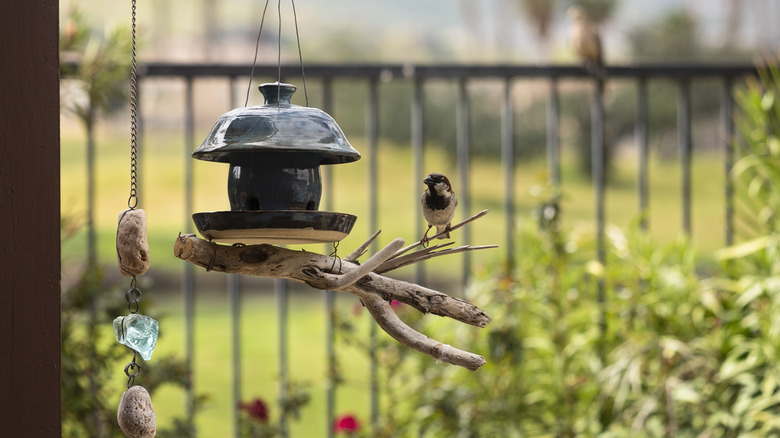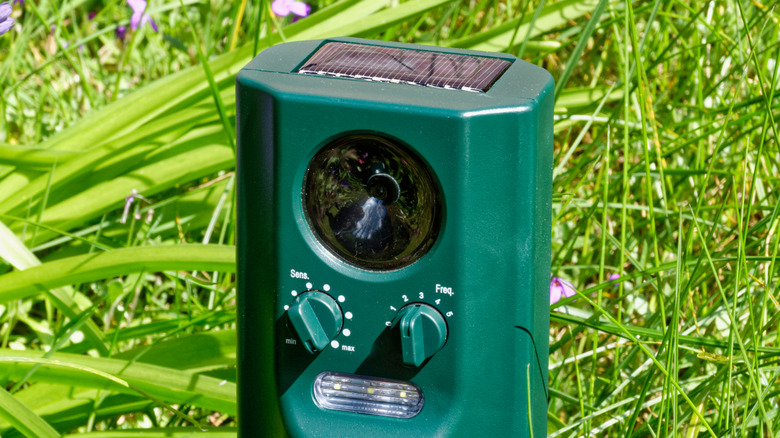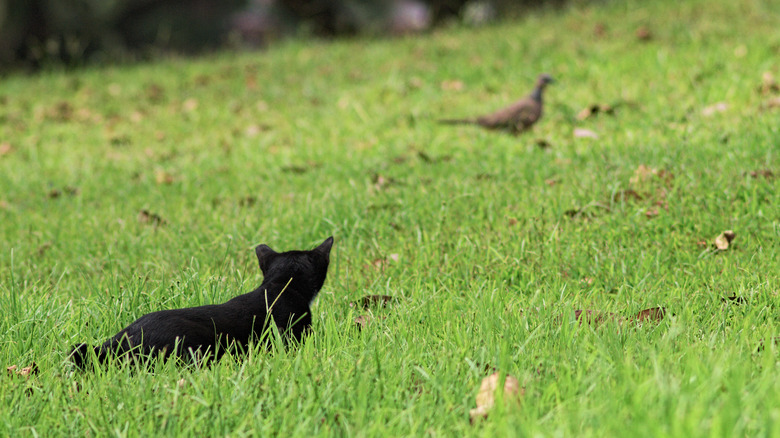Is Ultrasonic Pest Control Safe For A Bird Watcher's Yard?
When you add a bird feeder or birdhouse in your yard, the intention is to fill your yard with birds. Your bird-watching efforts are thwarted when rats, mice, and squirrels steal all the birdseed or bored cats prey on nesting birds. Ultrasonic pest control, devices that emit sound at frequencies higher than 20,000 Hz, are touted as a safe and effective alternative to far less humane pest control solutions like trapping or poisoning — at least by the manufacturers. The idea is that the irritating high-pitched sound drives away rodents and their troublesome kin. However, birds aren't affected because, like humans, they can't hear such high frequencies. While this means the machines are likely safe to use around birds, other factors — from wasting money on useless products to possible auditory damage — make it a less desirable method.
Research into the use of these machines as bird deterrents further proves this point. For example, a paper presented at the Proceedings of the Fifteenth Vertebrate Pest Conference 1992 proposed that since birds can only hear sounds between 60 Hz and 15,000 Hz — sounds well below the 20,000 Hz an ultrasonic device emits — and the sound doesn't travel far from the device, they're unaffected by it. Researchers discovered pigeons nesting (yes, nesting!) atop a device, clearly undeterred by its sound, per IFAS Extension. More recent research suggests that a few avian species, like birds with high-pitched songs, can hear frequencies up to 20,000 Hz — still not high enough to be affected by ultrasonic sound.
Mixed messages
Contrarily, there's some evidence that constant or repeated exposure to loud noises damages birds' hearing (and, concerningly, dogs' and possibly cats' hearing, too), so don't place an ultrasonic pest control device nearby or in birdhouses or feeders. Also, most birds don't like changes in their environment, a trait called neophobia. The device's presence (rather than the sound it emits) might deter visitors in the short term — at least until they get used to it. Birds may also flee in response to other animals fleeing the sound of the device, even if they can't hear it. But again, this effect would likely only be temporary.
Before you jump online and order a device, you need to know that there's a broader issue at play. The fact is that ultrasonic pest control may not work at all. Installing a machine in your garden is more likely to waste time and money than an effective way to pest-proof your yard. Though, anecdotally, users swear by their efficacy, the few studies completed on these devices show they're everything from minimally effective on certain insects to completely ineffective on all pests and predators. As far back as the late 1980s, experts were calling into question the efficacy of these products. In fact, numerous device manufacturers were penalized by the Federal Trade Commission for making false product claims (via Nebraska Extension in Lancaster County).
They don't work
When testing ultrasonic devices, a New Zealand Department of Conservation researcher found a stoat — a common local wild bird predator — sleeping right next to a machine, reports Consumer in a 2021 article. Dave Pehling, analyst and writer of WSU Snohomish County Extension guidance, last reviewed in 2020, states definitively that both ultrasonic and sub-sonic pest control devices lack any proof of efficacy. The machines could even attract rather than repel rodents. In New Zealand, devices emitting ultrasonic rat baby cries attracted adult rats to traps (via Predator Free NZ). What's more, ultrasound is absorbed by anything soft, further limiting its range.
Are you dealing with bird-stalking cats specifically? You might be in luck! A 2018 paper published in Global Ecology and Conservation by Australian researchers found that "ultrasonic deterrents reduced the frequency of incursions into gardens by resident cats by 46%, while the duration of incursions was reduced by 78%." What's more, birds (and a few other well-liked backyard visitors of the marsupial kind) appeared unaffected. Still, if you want to try an ultrasonic pest repeller in your backyard, even after everything you've read here, we advise keeping your credit card in your wallet. Research stating they don't work aside, you'll be hard-pressed to find a seller that doesn't claim it's effective against birds. Finding a device that explicitly states it's bird-safe is even more challenging. Is installing one worth the — albeit small, if any — risk to the well-being of your beloved feathered friends?


